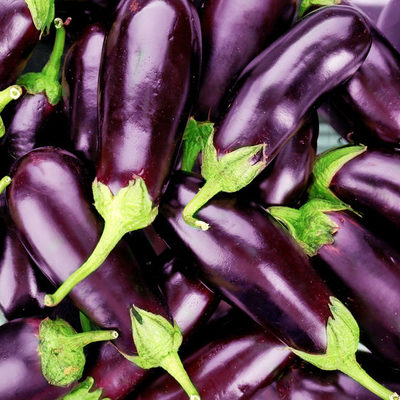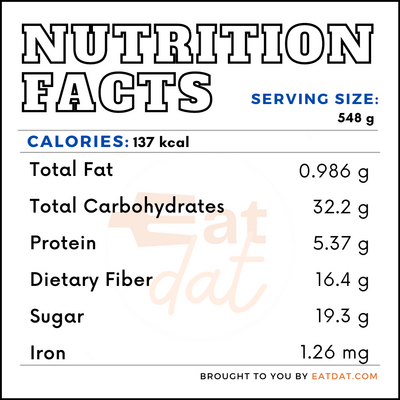
Eggplant
Also know as Aubergine or Brinjal
What is an Eggplant?
The eggplant, otherwise known as aubergine or brinjal, is a plant from the Nightshade family. While it is technically a fruit, it is usually prepared as a vegetable. Commonly purple, this food has a spongy, absorbent texture.
- In the U.S., this food only accounts for $100 million of sales, however, it does attract more Asian consumers than other fresh foods.
- Eggplant is popular in many different cuisines ranging from Mediterranean to Middle Eastern.
The 10 of the most popular ways to eat eggplants, according to Bon Appétit are:
- Pan-seared
- Marinated
- In a frittata
- Slow-cooked
- Roasted
- Eggplant Parmesan
- Eggplant Bake
- Stuffed
- In a dip
- As a warm salad
Origin
This food thrives in warm, subtropical climates and rightly so it originated in China and India many centuries ago. Written records from the 5th century detail how eggplants were already a popular crop in the Western Jin Dynasty (266-420). This first mention described how to use the skin of this food to create a natural dye. Used for its medicinal purposes, this fresh food would later travel to Persia and then the Mediterranean by the 7th and 8th centuries. In the 1500s, eggplant would become so widespread that the Spanish would carry it with them to the New World.
By the 1800s, there were two known varieties of this food in the Americas: large purple and early purple. This crop was popular with many home gardeners as it could be used in a plethora of homemade recipes. Immigrants from the Middle East and the Mediterranean popularized this food through their recipes. Later in the 1960s, smaller Japanese versions of this food became more popular and therefore available for home gardeners. Today, the majority of eggplants produced in the United States are for the fresh market.
Nutrition
Eggplants are low in calories and fat-free but full of the vitamins and minerals needed for a healthy diet. One eggplant, unpeeled (548g) can contain:

The antioxidants in this food help fight free radicals and may help prevent a range of diseases. A diet that includes eggplant may improve heart health, cholesterol, cognitive function, eye health, and weight management. Scientists also believe that this food has nutrients that can help combat cancer.
Commercial production of Eggplants
The eggplant is classified as a specialty product but is still widely grown in the United States. Although there are less than 7,000 acres of eggplant fields, approximately 142 million pounds of this food were produced in 2015. Production yield averages 25,000 pounds per acre of this crop. Similar to tomatoes, this purple vegetable requires room to climb, warm, and plenty of water to survive. Farmers know to plant this crop after the last spring frost and give it a sunny place to grow.
Uses
Like most fresh foods, an eggplant tastes best when just picked off the plant. This food is sensitive and does not store well for long periods of time, so you should take special care of it. Eggplants can be stored at room temperature for 1-2 days, for any longer they should be stored in the refrigerator. In the refrigerator, you can keep this vegetable for 5-7 days in the crisper drawer. Blanching or steaming this food will make it suitable for storing in the freezer for up to six months.
Eggplant Recipes
This spongy, purple food is used in many savory dishes. Here are some popular recipes:
FDA Regulation
For the Food & Drug Administration, eggplant falls under the category of food that is rarely consumed raw. Considering that this food is typically cooked, the FDA doesn’t deem it necessary to regulate its growing, harvesting, or packaging. This food is exempt from the Produce Safety Rule alongside a long list of other fresh fruits, vegetables, and nuts.
References
Thorton-Wood, Simon, Dr. “History and Iconography of Eggplant” Purdue.edu, Purdue University, https://www.hort.purdue.edu/newcrop/chronicaeggplant.pdf
Trujillo, Linda. “The Elegant Eggplant.” Master Gardener’s Journal, University of Arizona Cooperative Extension, Maricopa County, 26 Jan. 2003, cals.arizona.edu/maricopa/garden/html/pubs/0203/eggplant.html.
“Eggplant: Health Benefits and Nutritional Information.” Medical News Today, MediLexicon International, 8 Nov. 2019, www.medicalnewstoday.com/articles/279359.
“CFR – Code of Federal Regulations Title 21.” Accessdata.fda.gov, U.S Food & Drug Administration, 1 Apr. 2019, www.accessdata.fda.gov/scripts/cdrh/cfdocs/cfCFR/CFRSearch.cfm?fr=112.2.
